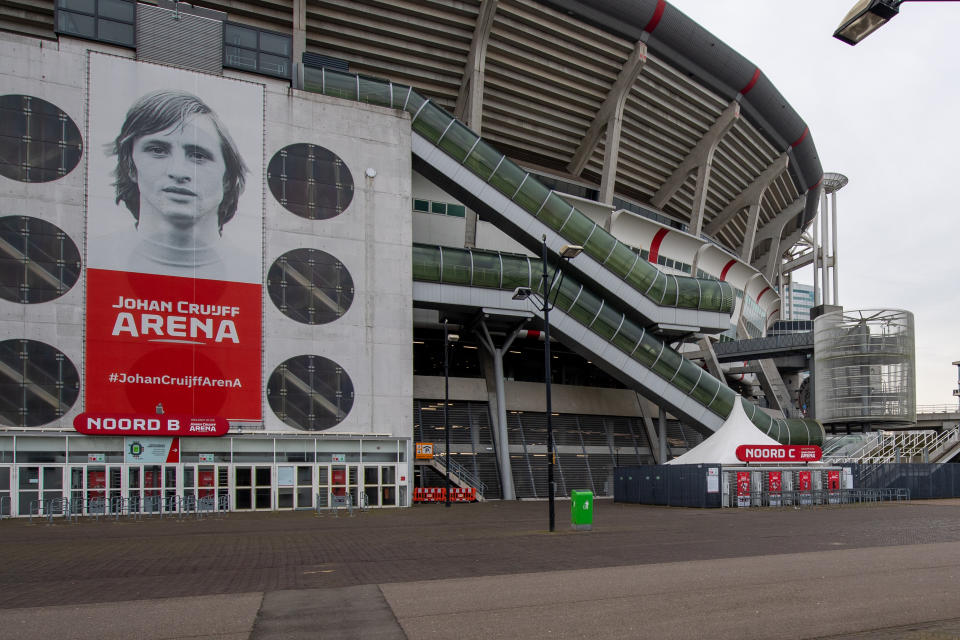Is the Dutch soccer league canceling its season premature — or prelude?
Two distinct schools of thought are emerging. On the one hand, you have the Bundesliga-nians. On the other, the Eredivisie-onists. Battle lines are being drawn.
Last week, the Dutch government announced that it would not permit any professional soccer until Sept. 1 at the earliest because of the coronavirus. The Dutch federation then decided that the remainder of the season, at both the professional and amateur levels, would be canceled, since it would certainly miss UEFA’s Aug. 29 deadline for completing domestic seasons.
The 2019-20 Eredivisie campaign was over and more or less null and void.
The backlash was predictable and instantaneous. First-place Ajax was upset that it wouldn’t be awarded the title because the season had seven rounds of games left to run. AZ Alkmaar was angry that, even though it was level on points with Ajax and had been in much better form, it was given the lesser Champions League place — requiring an added round of qualifying. FC Utrecht missed out on the Europa League by three points but had a game in hand and a better goal difference than fifth-placed Willem II. Its owner has announced that the club will sue.
Down in the second tier, Cambuur missed out on promotion because there won’t be any this season, a setback which the club says has endangered its continued existence. A lawsuit seems inevitable there, too.
The whole thing is a big mess that has left nobody entirely happy. But then the Dutch government, which was very slow to lock down the country after flirting with an ill-fated herd-immunity approach, didn’t leave any alternative.
The Dutch model also stands in stark contrast to that employed by, well, just about everyone else.

The German Bundesliga led the way, with teams resuming practice in early April, albeit socially distanced. The thinking was that if the federal German government decides to loosen restrictions on May 9 — a decision expected to be made on April 30 — the league will be ready to resume immediately rather than lose yet more time getting players back into playing shape. It might well be that the government decides against it, and Chancellor Angela Merkel has indicated that the nation may not be quite ready. But the clubs want to kick off as soon as they possibly can and remain at the ready — although nobody expects anything but soccer behind closed doors and without fans.
In Italy, Serie A, the league impacted first in the nation hit hardest, restrictions are easing. Starting May 4, players will be allowed to practice individually. Two weeks later, they will train in groups. And games are expected to resume June 2.
The Premier League clubs in England, which has lagged behind on a later pandemic timetable than most other European countries, have signaled to the players that they hope to return to practice by June 1. Games might resume as early as June 8.
In Spain, La Liga appeared ready to clear players who tested negative for the virus to return to training as early as next week, but backtracked when it became apparent that there weren’t enough tests for the front-line workers and soccer players. The clubs, naturally, didn’t want to hamstring the health care providers but seem eager to return to play whenever the tests do become available.
Ligue 1 in France hopes to kick off again on June 17. And stateside, Major League Soccer and the National Women’s Soccer League both extended their training moratorium through May 15, but the Washington Post reported that the NWSL has asked its players to return to their teams by May 16 to start their training camps, suggesting a mooted start to the season sometime in June.
The question here is whether the Dutch were too quick to cancel or if the others remain naïve. Again, the Eredivisie wasn’t given any choice in the matter. But there’s also a sense that other leagues might be acting optimistically. Their governments have made clear that no date to relax their respective lockdowns is set in stone. Every target date is written in pencil, dependent on the slow ebb of the pandemic.
The incentives to aim for a quick return are ample, of course, almost all of them financial. But it must also occur to the clubs in all of those other leagues that Ajax’s fate, or AZ’s, or FC Utrecht’s, could well be their own. That scrapping the balance of the season remains plausible. That Liverpool could be denied its first Premier League title after all. That teams on the ascent could still miss out on European places. That relegation could be canceled and promotion scrapped.
And maybe, as with everything else during this pandemic, those who seemed premature might actually have been prescient.
Leander Schaerlaeckens is a Yahoo Sports soccer columnist and a sports communication lecturer at Marist College. Follow him on Twitter @LeanderAlphabet.
More from Yahoo Sports:



